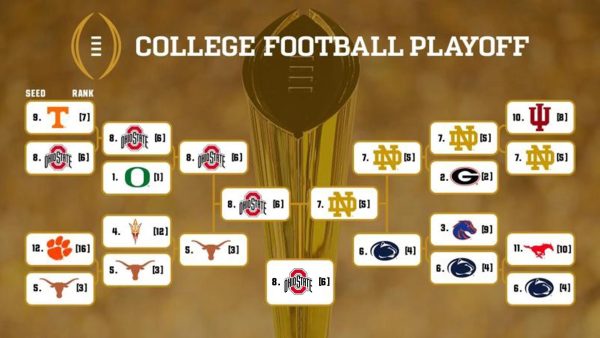Aunt Becky goes to jail
College admissions scandal should anger high school students
Olivia Jade Giannulli celebrates with her mom, Lori, after her rowing team came in first place at a weekend regatta.
The most stressful part of high school isn’t exams, isn’t research papers, and isn’t even in high school. It’s college.
College – or rather, getting into college – represents the light at the end of the late-night and caffeine-filled tunnel. It represents hard work, extra credit assignments, and sacrifices we make on the altar of the almighty A+. When we do these things, we tell ourselves that we have done everything we can in order to have a fair shake in the college admissions process. However, our efforts are not the same as those available to some of the wealthiest high schoolers in America, or more specifically, the efforts of their oftentimes famous parents.
Olivia Jade Giannulli, a former freshman at the University of Southern California is one such example of this college admissions shortcut in action. The daughter of actress Lori Loughlin, who played Aunt Becky on “Full House,” and fashion designer Mossimo Giannulli, Olivia was granted admission to USC, a school with an acceptance rate of roughly 18%, after receiving a spot as a stand-in on the school’s rowing team. The catch: Olivia Jade is not a rower.
As the FBI investigation alleges, Loughlin achieved admittance for Olivia Jade, as well as her other daughter, in the same way that many wealthy parents have been doing for a disturbing amount of time. From fake athletic participation to fabricated SAT score reports, many members of the American upper class have decided to skip the stress and hard work associated with the college admissions process.
Now, if you want to get into all of the nitty gritty details of what exactly Loughlin, Felicity Huffman, and other notable parents did to get their kids into Ivy League schools and other esteemed universities, all you have to do is type in any combination of search terms revolving around rich parents or simply “college admission scandal.” William Singer, the alleged mastermind behind what is now the largest college admission scandal in history, left a fair amount of evidence for public consumption.
But what I really want to discuss – more than bond amounts or poorly worded emails – is how we should feel about such an egregious disregard for the rules of the college admissions process. See, since this story broke I have heard a disconcerting amount of people saying, “Well, if I had money I would do the same thing.”
This justification reveals an underlying problem: our tendency to disconnect celebrities from reality, and therefore, the law. While Americans like to view the wealthy and famous with rose-colored glasses, they’re not above the law. What these people have done is ILLEGAL.
No amount of money can erase the fact that what Singer and his clients did wasn’t simply a justifiable instance of Darwinism – of the wealthy looking after their own – but rather, fraud. Even if college admissions numbers are naturally skewed to look after the wealthy, who have access to SAT tutors and can partake in extracurriculars during the time others dedicate to a second job, they broke the rules. It only makes sense that they will face legal repercussions, which in turn impact not only their professional careers, but their personal lives as well. No amount of money will save them from these consequences. No amount of money can make their decision worthwhile.
The biggest issue regarding this whole scandal is the disparity it caused in the college admission process. College admissions, in my mind, should offer an even playing field. No matter who you are, what school you’re attending, or where you came from, the degree you receive at the end of your education should reflect that you earned something of your own merit.
Whether you came from poverty or were born with a silver spoon in your mouth, you should earn your spot in college. You put in the grades, trained hard at your sport, or maybe even just maintained the bare minimum amount of desire to pull you through the temptation to just give up, and your spot in college shows all of that effort you put toward it.
If we can just buy our spot in college, however, what does that accomplishment even mean?
Now, I know what you’re thinking, “Life isn’t fair,” and that’s true, but shouldn’t we want to fight this inequality in spite of that? If we had that same attitude in medicine, we’d give up and let people die of the common cold. We don’t insist that flaws in any other system “are just a fact of life.” When there’s a car accident, we don’t permanently shut down traffic. Sure we can’t control what home we’re born into or what unexpected hardships we will face, but allowing others to buy a ticket into a prestigious school isn’t just the wheel of fortune.
We cannot be okay with the wealthy cheating the system of college admissions simply because they can. Allowing students admission into a school based on anything other than their own merit challenges the very purpose of our education. School is meant to provide the opportunity for every student to assert their own claim in life. Our education should level the playing field, taking us from what we’re born with to what we’ve worked for. Taking away the work aspect makes it nearly impossible for regular students to compete with the sons and daughters of the ultra-rich.
So the next time you read an article about the celebrity college scandal, try and feel a little alarmed. These students are buying opportunities that we spend our blood, sweat, and tears for. Picture the hardest working student you know, the one who studies during lunch or never misses an early practice, who knows what they want and is willing to work for it. You don’t know they’ll get into the college of their dreams, whereas Lori Loughlin knew her unqualified daughter was going to get into hers.
Olivia Jade took one photograph on a rowing machine and was given admittance to USC. Following her admission to the very selective university, she took to twitter saying, “I don’t really care about school.” If, as a high school student, that doesn’t make you angry, I don’t know what will.






